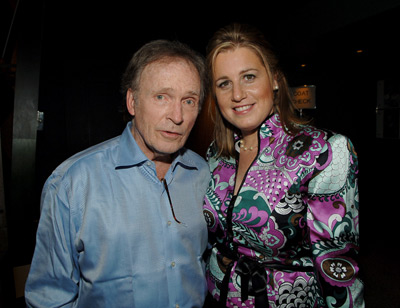
Dick Cavett
Birthday: 19 November 1936, Gibbon, Nebraska, USA
Birth Name: Richard Alva Cavett
Height: 169 cm
Yale-educated Dick Cavett established his reputation as the most erudite of American talk show hosts in the late 1960s and early '70s. Although there were many contenders who took on Johnny Carso ...Show More

[on writing for Johnny Carson] I was a starving actor. And I wanted to be a comic, I thought vaguely Show more
[on writing for Johnny Carson] I was a starving actor. And I wanted to be a comic, I thought vaguely. But most of all, I wanted to be on a talk show--as a guest--and even if I'd done it only once, I could go back to Nebraska and say, "I made it", just like Johnny, who left Nebraska 12 years before me . . . There were sides of Johnny that I didn't know. But I know he was one of the unhappiest men in the world. But he loved me, so I felt good about him . . . Oh, God, he had a wretched mother. One time Johnny wins some great prestigious award, and she says, "I guess they know what they're doing" . . . She never encouraged him. And when I worked for him, there was an awful lot of tension. He was like a wire, a tight wire . . . And he had a wife on the ledge, and drinking troubles. His happiest hour was when he was out there on the set, and the rest of his life was really horrible. Hide
[on writer Walter Kempley] I liked Walt Kempley. I started appearing on television--which must have Show more
[on writer Walter Kempley] I liked Walt Kempley. I started appearing on television--which must have killed Paul Keyes. Walter took me aside one day and said, "Hey, kid, I'm real proud of you." Something Keyes would never have done. Jack Paar told me that Kempley owed him $1000 and he never paid it back. Bob Howard was a splendid guy. Bob had been a Bob Hope writer. He told me that when the war ended Hope went crazy because he no longer had soldier audiences, the only place he could get a big crowd that turned him on. Hide
[about interviewing George Harrison] I remember saying to him, "Yoko Ono sat in that chair". And he Show more
[about interviewing George Harrison] I remember saying to him, "Yoko Ono sat in that chair". And he knew to jump out of it, horrified. And by the end of the show, he was as interesting as anyone I had met. If you can convince them that you're not going to hurt them, that security led people to say, "I've never felt this good on a talk show. My God, I don't know how you got me to talk about my abortion". And that was a man. Hide
There's so much comedy on television. Does that cause comedy in the streets?
There's so much comedy on television. Does that cause comedy in the streets?
At one point, I thought, "I'm not so sure I want to become the poster boy for depression". But I sti Show more
At one point, I thought, "I'm not so sure I want to become the poster boy for depression". But I still get mail about it, even today: "You saved my dad's life", "You helped me acknowledge my own depression", "If Cavett can have this, then I guess it's all right for me to" . . . Depression is epidemic because it's still so undiagnosed. And even my analyst made the mistake of saying to me--after I'd told him I wished he knew for a minute what my depression felt like--he said, "Oh, that's all right, I was pretty low when my dad died". I sat up and said, "You think grief is even close to this?". He apologized. Hide
[on being a talk-show host] It's a wonderful job for people who have never had a nervous breakdown a Show more
[on being a talk-show host] It's a wonderful job for people who have never had a nervous breakdown and have always wanted one. Hide
I'm perplexed when people adopt the modish abbreviation "Ms.," which doesn't abbreviate anything exc Show more
I'm perplexed when people adopt the modish abbreviation "Ms.," which doesn't abbreviate anything except common sense. Hide
I never missed a Jack Paar show until I made my ludicrously ballsy move and got myself hired by him. Show more
I never missed a Jack Paar show until I made my ludicrously ballsy move and got myself hired by him. I was a copy boy for "Time" magazine, and someone left "The Herald Tribune" open on the copy boy desk, and I read Marie Torre's column about Jack Paar. It said he worried more about his monologue than anything else. So I went home and typed one up, then took it to the bowels of the RCA Building and sneaked up to NBC. Of course, if there was security like there is now, I'd never be here today . . . So here comes Jack Paar, walking out of the men's room, and I had the wits to put the monologue in a "Time" magazine envelope, and that caught his eye. I hand it to him. "I wrote a monologue for you, Mr. Paar". "'Oh yeah?" he says. And I think that's that for my monologue. But that night he ad-libbed three of my lines on the show. Hide
[on writer Pat McCormick] Pat was the opposite of Paul Keyes in almost every way. A friendly, wonder Show more
[on writer Pat McCormick] Pat was the opposite of Paul Keyes in almost every way. A friendly, wonderful friend and a hilarious man, just as his friend Jonathan Winters was. Pat didn't have a nasty side at all. I saw him get in a fight with a cab driver once, but that doesn't count. Pat said some of the funniest things ever. There were people who didn't find it funny because it seemed mean . . . Humorless people. Pat had a hilarious way of pointing to someone disabled and loudly giggling and getting their attention. You would think they'd be offended, but they'd see Pat McCormick's big, friendly, babylike face and laugh. Sometimes [writer David Lloyd] and I didn't want the risk and we would try and distract him if a nun was coming toward us. One day a guy wearing a heavy iron leg brace came clunking along toward us. David tried to distract Pat. It wasn't so much that we didn't want someone's feelings hurt, it was that we were weak from laughing at Pat! The man with the clunking leg brace walked by and then out of incredible odds came another man with a clunking leg brace totally unrelated. Pat asked him, "Is this the way to the FDR rummage sale?" Hide
[on Stu Hample] He was a great appreciator of comedy. He was an extremely funny man. He could be fun Show more
[on Stu Hample] He was a great appreciator of comedy. He was an extremely funny man. He could be funny in a good stand-up comedy way in your living room. or walking across the park. And he had a prodigious memory for comic literature and could quote whole routines--with the accuracy they deserved. Hide
I remember being in a play once, and there were just 30 minutes left, and I thought, "I don't want t Show more
I remember being in a play once, and there were just 30 minutes left, and I thought, "I don't want this ever to end". It's like being in a protective womb for a couple hours, then the poor actor has to go home. Hide
[on writer Paul Keyes] Paul was a devious man with an element of paranoia and a distinctly undesirab Show more
[on writer Paul Keyes] Paul was a devious man with an element of paranoia and a distinctly undesirable streak of just about everything. Hide
[on writer Pat McCormick] If you ever got into an elevator with Pat you had to prepare yourself to s Show more
[on writer Pat McCormick] If you ever got into an elevator with Pat you had to prepare yourself to sink to the floor with laughter, whether it was loudly farting or just some hilarious remark. I remember seeing [writer] David Lloyd off to Europe. He was a nervous wreck with his small children and he was just in pieces, hoping everything was okay, holding papers, dropping them all over the place, standing at the dock. They were headed toward [an] official. Pat came along and said, "Hey, the make-up covered up your kids' measles just great!" David was not amused. Hide
Anyone who steals another comic's material should be sentenced for life to reading Aristophanes to t Show more
Anyone who steals another comic's material should be sentenced for life to reading Aristophanes to the O.J. [O.J. Simpson] jury. Hide
[on making President Richard Nixon angry] Well, apparently the White House was furious about a show Show more
[on making President Richard Nixon angry] Well, apparently the White House was furious about a show I did with John Kerry and John O'Neill, debating the Vietnam War. That started it. Then, your friend and mine John Lennon asked if I'd come down to court and assert that he should not be deported by the Nixon administration. That really did it . . . You can even go to YouTube after lunch and listen to Nixon asking [H.R. Haldeman], 'What can we do to screw Cavett?' And years later I learned from several members of my staff that he had used one of his favorite illegal hobbies and had the IRS [Internal Revenue Service] audit all of them, which was just hurting "the little people", in the words of Joan Crawford. Hide
[on Jack Douglas] He wrote for Jack Paar way before I got there. Yeah. He wrote some of the funniest Show more
[on Jack Douglas] He wrote for Jack Paar way before I got there. Yeah. He wrote some of the funniest things I had ever heard. [Reiko Douglas] was his Japanese bride and he brought her on [Tonight Starring Jack Paar (1957)] in total Japanese geisha outfit. She sat down and Jack Paar, who had a tendency to condescend slightly to foreign people said, "Reiko . . . what. have. you. been. doing. in. America?" Reiko, with this exquisite face, says, "Photographing military installations". Hide
Dick Cavett's FILMOGRAPHY
as Actor (223)
 Dick Cavett'S roles
Dick Cavett'S roles

























































